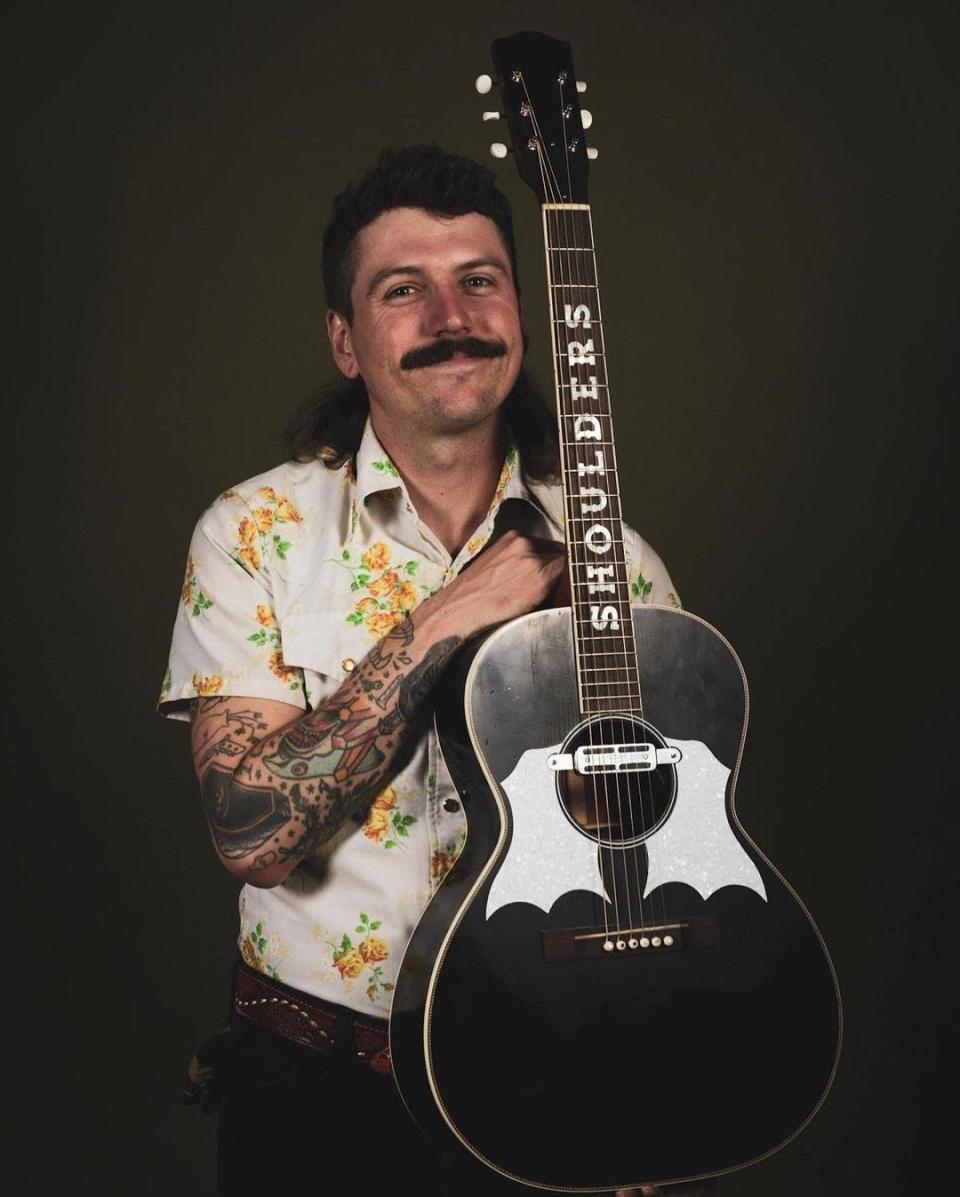Nick Shoulders' rootsy rock rolls with political themes, timeless country, soul flair
- Oops!Something went wrong.Please try again later.
- Oops!Something went wrong.Please try again later.
North Arkansas native Nick Shoulders was born an hour north of Ashley McBryde's hometown and 100 miles east of Tulsa, Oklahoma. He's a successful artist in the fullest, multimedia sense of the term. His recent cowpunk acclaim is not another story of a busking Americana aficionado uprooted from struggle in the middle of nowhere and flung from TikTok or YouTube onto the global radar.
Shoulders is also an illustrator, muralist and intellectual. His approach to country music is influenced by artists with whom he's worked — like Shawn James and the Shapeshifters' eponymous lead singer — whose time in Nashville at the height of the bro-country boom led them to find a musical community 500 miles away from Lower Broadway in Fayetteville, Arkansas.
There, alongside players like Shoulders, a community defined by folk, gothic blues, punk rock and early R&B recordings was fostered.

"I humbly make sounds in the shadows of music," says Shoulders to The Tennessean.
In conversations before the one 34-year-old Shoulders had with The Tennessean as East Nashville's Vinyl Tap during Americana Fest, he's stated that he views the genre as more his "sacred inheritance" and less a "marketing scheme."
Time spent in "moldy little honky tonks" offered the "liberation" of "ancient singing traditions" and dialing back to sounds and styles crafted directly before commerce impacted them.
The difference between playing the blues in 1949, country in 1926 and rock 'n' roll in 1954, instead of one year later when mass media and commerce directly impacted them, is a remarkable inventiveness.
Songs on Shoulders' 2023 album "All Bad" reflect an anti-capitalist, left-wing doctrine that removes limitations on creativity traditionally set by country and Americana's commercial gatekeepers.
In contrast to the types of sounds typically highlighted by klieg lights in arenas and stadiums, this music is among the authentic working-class country that's achieved broad appeal lately.
Shoulders says he views making country music as his latest "anthropology project."
His sounds are not stripped of what the performer calls the "palpable undercurrent of darkness and nightmarish violence and suffering" that informs all facets of the Southern musical tradition.
When juxtaposed with his political leanings, hearing Shoulders talk about singing in an "old, Southern and gospel-inspired style" and playing "buoyant, yet hard syncopated zydeco blues" at "hillbilly dance halls" feels incongruent. The types of people who argue about fascism are stereotypically not the same people who two-step or jump and jive.
"I'm not making music for hipsters with their arms crossed," Shoulders says. "This is reactionary music rooted in a hybrid of cultures being against systems of oppression, but also meant for sweaty rooms with people smashed against each other."

"Won't Fence Us In" has Shoulders wishing every golf course could become a wildlife management area.
The song is a two-stepper happily lost somewhere between a juke joint and Bob Dylan being subterranean and homesick with the blues.
"Whooped If You Will" is similar but different. The yodeling ballad is best for either cooling down or steaming up (depending on your perspective) a party favoring swinging and jazzy records. Shoulders' vocal performance is at the intersection of a Patsy Cline-style falsetto and Solomon Burke's gospel-rooted soul, which doesn't place him in mainstream conversations about Lainey Wilson or Luke Combs. But the quality of his work puts his album in a historically adjacent space.
On songs like "Appreciate Ya," a honky-tonk style tack piano makes the use of an electric guitar feel dialed back to the era of Louis Jordan and His Tympany Five's 1940s proto-rock 'n' roll hits like "Saturday Night Fish Fry."
Shoulders offers notions as time-worn as his sounds to describe himself best.
"As much as I'm an artist pained by how much I care about how I make my music, it's easier and more fun to describe me as a rock rolling around in a levee at the bottom of the Mississippi River," he says.
This article originally appeared on Nashville Tennessean: Nick Shoulders' rock rolls with anti-capitalist, left-wing messages

